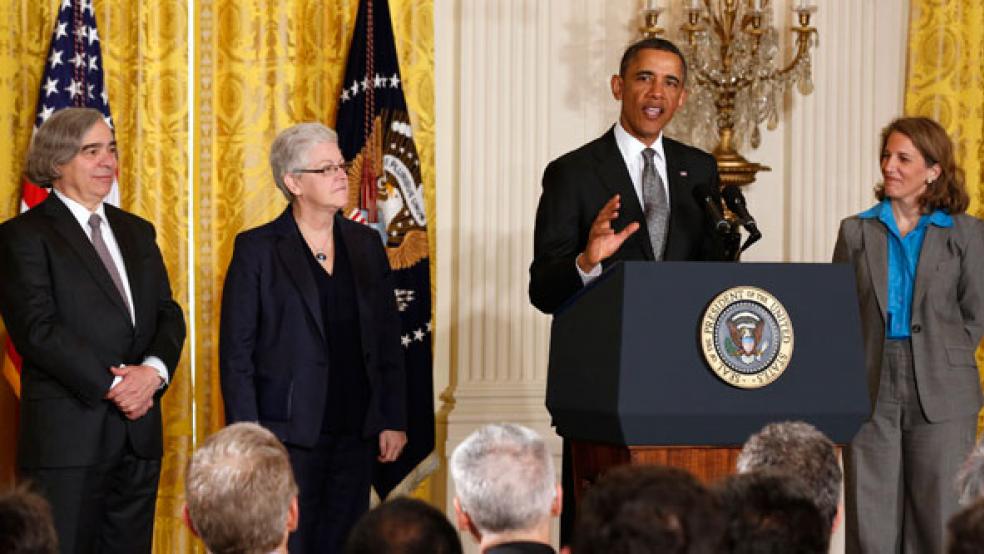The death of Venezuelan President Hugo Chavez, ongoing problems in Iran, and trouble brewing in Nigeria, make America’s economy more vulnerable than ever to the loose cannons who oversee some of the rich oil fields we depend on. But we don’t have to be hostages to foreign oil when we’re sitting on enough rich natural gas to be energy independent.

That goal, however, would take a national leader with a clear and compelling energy plan. That leader is not President Obama.
Obama has been pursuing legacy issues with the fervor of Dick Cheney hunting quail. Ironically, he has failed to embrace the biggest game-changer handed a U.S. president in generations –an enormous jump in domestic energy resources. President Obama could at this moment be aggressively moving the U.S. off our expensive dependence on imported oil, lowering costs for U.S. producers and bolstering our global competitiveness. Most important, he could be creating jobs.
As Robert McFarlane and George Olah wrote recently in the Financial Times, “Imagine what could be done to restore the strength of our economy if we invested the $600 billion a year we spent on securing foreign oil on education, infrastructure, research and renewal.” Instead, Mr. Obama plays politics.
In a new book, The Dispensable Nation: America Foreign Policy in Retreat, former State Department official Vali Nasr accuses President Obama of “dithering” over foreign policy. The president is equally indecisive on energy policy. Consider his vacillation over the future of the KeystoneXL pipeline. Mr. Obama continues to teeter between doing what’s right for the country – and for jobless Americans -- and what is pleasing to environmentalists.
In Obama’s just-announced picks to head the Department of Energy and the EPA, his balancing act continues. Ernest Moniz, an MIT nuclear physicist, has been tapped to lead Energy; Gina McCarthy, a clean air zealot, will take over the EPA. Both are seasoned Beltway players. Before long, they will butt heads, all but ensuring gridlock.
Mr. Moniz has been supportive of nuclear power, clean coal as well as renewable energy. He is perhaps best known for a study published by MIT on the future of natural gas, which was presented to the Senate Committee on Energy and Natural Resources in 2011.
In that report, Moniz concluded that “given the large amounts of natural gas available in the U.S. at moderate cost (enabled to a large degree by the shale gas resource), natural gas can indeed play an important role over the next couple of decades…. in economically advancing a clean energy system.”
Much to the consternation of the Sierra Club, among others, Moniz waxes enthusiastic about the shale revolution. The study points out, “the proportion of total U.S. gas production coming from shale resources grew from less than 1 percent in 2000, to 20 percent in 2010. By the end of 2011, this is expected to reach 25 percent. Such growth rates would be remarkable in any context, but in the U.S., the world’s largest gas producing nation, it really does represent a paradigm shift.”
Moniz and his colleagues dismiss the environmental issues stemming from shale gas production as “challenging but manageable.” Most encouraging, the report touts the prospects “that shale gas production can result in a large industrial activity.”
That kind of clear-headedness is rare in the Obama White House. Rare and not especially welcome to the Sierra Club, whose director Michael Brune cautioned the appointee “to leave dangerous nuclear energy and toxic fracking behind while focusing on safe, clean energy sources like wind and solar.”
While Moniz will likely push shale gas development – and even nuclear power—we can expect Gina McCarthy to erect roadblocks. Ms. McCarthy, who has been serving as head of the Office of Air and Radiation, has been instrumental in spawning soot and mercury regulations that give power producers fits.
Responding to a 2007 Supreme Court decision giving the EPA authority to regulate carbon dioxide emissions, the agency set tough standards for new facilities that axed construction of additional coal plants. Going forward, McCarthy is expected to embrace tighter regulations for existing power plants, and possibly for refineries and other industrial facilities.
She will also likely continue the EPA’s assault on shale development. The agency is no friend to shale gas producers—Louisiana Senator Vitter has gone so far as to accuse the EPA of political motives in its biased attacks on the procedure. To Vitter’s point, the EPA has on three separate occasions launched highly publicized investigations of supposed water contamination from fracking, only to have to back down after their tests were proven flawed.
Almost a year ago the EPA announced its first-ever rules on methane and other gases released during the fracking process. The agency allowed industry more time to comply with its new regs than environmental groups had hoped; on the other hand they grabbed oversight from the states – not a good outcome for industry.
Reducing our dependence on imported oil is a must-check item for candidates running for office—a better energy policy is always right around the corner. But no president in modern times has actually had the opportunity to move the needle. Obama does. Study after study proves the case. Most recently, a detailed (and unbiased) examination of wells drilled into the Barnett Shale in Texas suggests even greater available resources than previously thought; we have literally decades of rising natural gas output ahead of us.
This resource should be tapped to the max. Natural gas is much cleaner than coal. Already the cost and regulatory-driven shift to gas is reducing our emissions. Unfortunately, for those who put climate control ahead of economic gains, no hydrocarbon is acceptable.
The administration should get its priorities straight, encouraging expanded use of natural gas in transportation as well as in power generation, promoting LNG exports – in short, harvesting this unexpected bounty to every possible advantage. Shifting and securing our energy future should be this administration’s shot at the moon – a legacy worth building.



